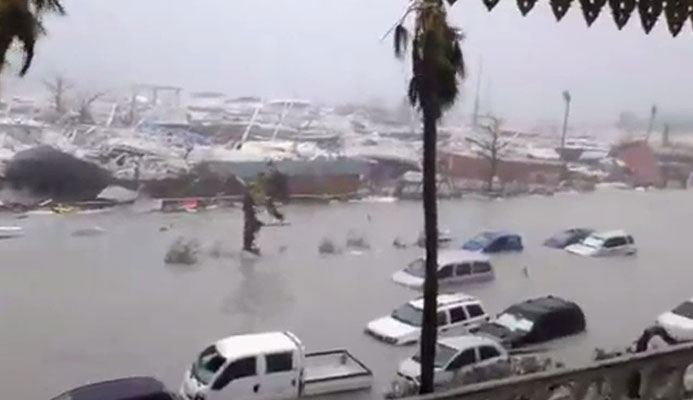The most powerful Atlantic Ocean storm in recorded history is sweeping across the Caribbean leaving destruction in its wake.
Hurricane Irma howled past Puerto Rico on Wednesday after thrashing several smaller islands with tree-snapping winds, drenching rains and pounding surf on a collision course with Florida.
The tiny island of Barbuda, which has a population of 1,800, and was devastated.
Its Prime Minister Gaston Browne said: "Barbuda is literally rubble. The entire housing stock was damaged. It is just a total devastation."
His government estimated destruction on Barbuda was "upwards of 90 per cent".
As Irma hit the Caribbean, with winds of 185mph that sounded like a freight train, buildings were destroyed and hotels flooded.
The eye of Irma was passing just north of Puerto Rico late on Wednesday, buffeting the U.S. island territory's capital, San Juan, with heavy downpours and strong winds that scattered tree limbs across roadways.
"The winds that we are experiencing right now are like nothing we have experienced before," Puerto Rico Governor Ricardo Rossello told CNN. "We expect a lot of damage, perhaps not as much as was seen in Barbuda."
British tourists were evacuated from the region or hunkered down amid warnings the storm was "potentially catastrophic". So far seven deaths have been reported- six in St Martin and one, a two-year-old child, in Barbuda
As the Caribbean takes stock of the trail of devastation, Florida is preparing for a potential direct strike. The eye of the hurricane passed over Barbuda at around 1.47am (5.47am BST).
It then moved on to the French islands of St Barts and St Martin, which officials said had suffered "major damage" with even the "most sturdy" buildings destroyed by winds that tore off rooftops and knocked out electricity.
On St Martin, an island split between the Netherlands and France, Irma has destroyed Princess Juliana Airport, which is best known for aircraft flying a matter of feet above holidaymakers on a nearby beach.
A Briton on St Martin posted live updates on Twitter as he sought shelter in a concrete stairwell from "apocalyptic" scenes, writing: "This is like a movie I never want to see."
Thousands of people have been evacuated as the hurricane churns a path also taking in Puerto Rico, the Dominican Republic, Haiti and Cuba before possibly hitting Florida over the weekend.
Boris Johnson, the Foreign Secretary, said the government was in touch with British overseas territories caught up in Irma, and was doing "everything we can to help those afflicted".
Officials in Puerto Rico had warned people to seek protection from Irma's "onslaught" in a statement that ended with: "May God protect us all."
The hurricane is so strong that it appeared on equipment designed to measure earthquakes, and has the potential for coastal storm surges of up to 20 feet (six metres) above normal tide levels.
President Donald Trump has declared emergencies in Florida, Puerto Rico and the US Virgin Islands, while authorities in the Bahamas said they would evacuate six southern islands.
A mandatory evacuation has been ordered from Florida's Key West and Miami Beach, where Philip Levine, the mayor, warned that anybody who stayed put would be “on your own._
With thousands of people fleeing Florida, air fares soared. Airlines, however, denied that they were gouging passengers and exploiting the crisis. .
Meanwhile two other storms were upgraded to hurricane status.
Hurricane Jose was 1,040 miles (1,675 kilometres) east of the Lesser Antilles in the Atlantic and packing maximum sustained winds of 75 miles per hour (120 kilometres per hour), the NHC said.
The NHC said that tropical storm Katia in the southwestern Gulf of Mexico had also become a hurricane.

